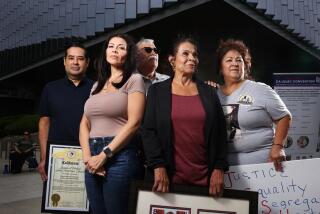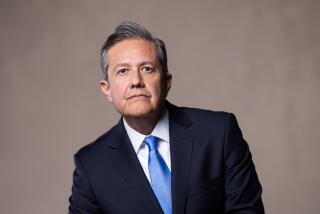Philip Newman, 85; Judge, Legal Advocate for the Poor
- Share via
Philip M. Newman, a former Los Angeles County Municipal and Superior Court judge who worked to provide legal services to the poor and to foster good relations with his native Mexico, has died. He was 85.
Newman died Wednesday in Los Angeles of natural causes.
In 1981, after nearly 18 years on the bench, Newman surprised the judiciary by announcing that he would not seek reelection because of what he called the “politicizing and demeaning of the judiciary by pressure groups, politicians and some of the media.”
He made the decision to return to the practice of law when his term ended the following year, even though he was two years short of the minimum 20-years service and five years short of the 70-year age line to receive the maximum judicial pension.
That was an era when various factions began challenging the tradition of reelecting judges without any campaign opposition. Once appointed--as most are to fill terms left vacant by retirement--judges had previously enjoyed serving until they chose to leave, with little need to raise campaign funds or curry voter attention.
But increasing unrest over courts in the late 1970s and early 1980s prompted a spate of candidates challenging judicial incumbents for their jobs.
Denying that he had any personal complaints, Newman quoted former state appellate Justice Robert Thompson, who warned that typical political fund-raising and campaigning could compromise a judge’s decisions. “A judge should be accountable to decisions of higher courts, mandates of the Legislature and, most importantly, to his own conscience,” Thompson had said, “and not to public opinion or popularity polls.”
Newman returned to the practice of law in 1982 and later became a private judge, a procedure in which litigants pay a qualified arbiter to decide a case quickly and behind closed doors.
He responded to the criticism that the “rent-a-judge” method excludes poorer litigants by telling the Christian Science Monitor in 1988: “I can’t think of any party having anything to lose by becoming involved in this court system.”
Named to the Municipal Court in 1964 by Gov. Pat Brown, Newman handled traffic cases, small claims, and minor civil and criminal cases, including several arrests for anti-Vietnam War demonstrations.
Colleagues on the then 64-judge court elected him presiding judge in 1975, and in August of that year, he was elevated to the Superior Court by Gov. Jerry Brown.
Newman was considered an even-handed, get-it-right judge, often commenting: “There are three sides to every story--the plaintiff’s side, the defendant’s side, and the truth.”
Newman was born in Mexico City, and at the age of 10 moved with his family to Los Angeles. He graduated from Santa Monica College, USC and Pacific Coast University School of Law before serving in the Coast Guard in World War II.
Joining the law practice of his father and brother in 1945, he served as consulting attorney to the consul general of Mexico in Los Angeles until he took the bench. Mayor Tom Bradley named him chairman of the Los Angeles-Mexico City Sister City Committee in 1974.
Interested in promoting legal services for the poor and relations with Mexico, Newman served as president of the Immigration and Naturalization Lawyers Assn. and as president of the Mexican-American Scholarship Foundation for Careers in Law. He earned a judicial service award from the Council of Mexican-American Affairs.
In 1966, Newman was named by President Lyndon B. Johnson to the National Advisory Committee of the Neighborhood Legal Services program in the Office of Economic Opportunity, and served for six years. He was a founding member and legal counsel of the Community Service Organization and vice president, secretary and director of the Youth Opportunities Foundation.
Newman frequently spoke on Latino problems in conferences at the White House and before Cabinet committees. In 1974, he was chosen one of 52 outstanding Spanish-speaking Americans by a publication sponsored by Carnation and Times-Mirror (former parent company of The Times).
Widowed in 1998 by the death of his wife of 54 years, Antoinette, Newman is survived by three children, Kathryn, John and Paul; a sister, Ana Maria Perez; and three grandchildren.
The family has asked that any memorial donations be made to Jobs for the Future at Dolores Mission Parish, 171 S. Gless St., Los Angeles, CA 90033.
More to Read
Sign up for Essential California
The most important California stories and recommendations in your inbox every morning.
You may occasionally receive promotional content from the Los Angeles Times.










